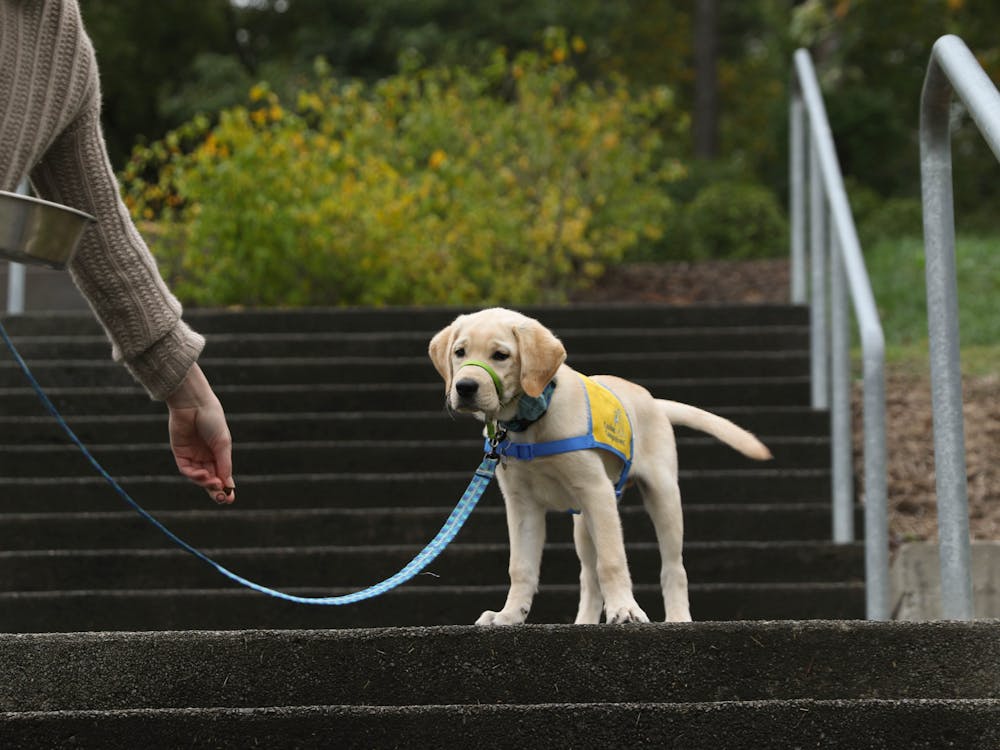Beginning in 2019, puppies with yellow vests could be spotted on walks around campus or gathered together for play time with students. As part of Duke Puppy Kindergarten, dozens of dogs were socialized around campus and taken care of by students during their first months of life.
But this year, there won’t be as many puppies roaming around. The current grant cycle that funded Puppy Kindergarten and its research through Canine Companions — a national organization that provides dogs for service training — is up at the end of 2024.
Funded by the National Institutes of Health, the program functions as a longitudinal study meant to determine whether different techniques of raising puppies impacts their cognition.
In the five years the program was in operation, Puppy Kindergarten hosted 101 puppies. Fifty were raised in a more typical style in people’s homes, while the remaining puppies were socialized on Duke’s campus, each rotating through living with four different students in their dorms.
According to Puppy Kindergarten Director Vanessa Woods, the researchers have not found a notable difference in the cognition of the puppies raised in different ways. With the data collection process for the original grant cycle complete, Puppy Kindergarten will not be reopening this semester.
“We think we have enough data right now to kind of answer [our research] question,” Woods said. “That's not to say that we won't open Puppy Kindergarten again, next semester or the semester after.”
The team is currently reapplying for funding with the National Institute of Health, but in the meantime, the program is transitioning to a student-led “puppy club.”
Woods said it’s important to preserve the presence of puppies around campus, even if in a different capacity than through a research project.
“We understand how much the puppy program means to people, and so we just wanted to make sure that this puppy club got launched so that people didn't have puppy withdrawal on campus, because the puppies have just made such a difference,” Woods said.
After being involved with Puppy Kindergarten since her first year at Duke, senior Sam Kefer is taking the lead on organizing the puppy club.
“Pretty much everybody on campus — including myself — doesn't want the puppies to leave, and we have so many volunteers who are really dedicated and who really want to keep working with the puppies,” she said.
This semester, Kefer is adopting a puppy through Canine Companions. Rather than the 10-week period that students cared for puppies through Puppy Kindergarten, she will take care of her dog for roughly a year and a half, at which point he will be ready for professional service training.
Kefer said the idea for a puppy club at Duke was inspired by similar organizations at other universities including the University of Pittsburgh, Tulane University and Clemson University. The clubs use a structure of volunteers who help take care of puppies while their primary owners are unavailable due to class and other obligations.
At Duke’s new club, primary puppy caregivers will be responsible for much of the funds for food, veterinary visits and other costs associated with raising the dogs. Kefer noted that Canine Companions has “financial aid sources” that students can apply for, and she also plans to hold fundraisers around campus to bring in money to support the club.
Senior Jamie Sokoloff, co-leader of the puppy club, said she’s excited for the joy the puppies will bring to campus.
“The puppies just bring everyone so much joy, and it's so much fun just to see little legs walking around on campus all the time,” Sokoloff said. “… It really just makes Duke such a special place.”
She has been involved with Puppy Kindergarten since her first year, participating as both a regular volunteer and a “dorm raiser.” Though she sees value in starting a club for people who still want to be involved with puppies, she also cautioned that being a full-time puppy raiser is more intense than just volunteering with Puppy Kindergarten.
“It is definitely a much larger commitment, both financially and time-wise,” Sokoloff said. “So I guess that's our goal, just to, you know, kind of build that support system and get a strong foundation because it’ll be very different from the kindergarten,” Sokoloff said.
Students interested in joining the puppy club can fill out the interest form.
Get The Chronicle straight to your inbox
Sign up for our weekly newsletter. Cancel at any time.

Madera Longstreet-Lipson is a Trinity sophomore and an associate news editor for the news department.

